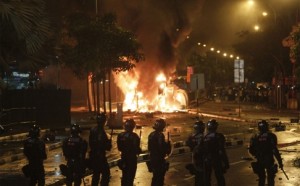By Mary Lee
It doesn’t take much to turn a disorderly group into a raging mob. Ask any driver who’s had to go down Race Course Road on a Sunday evening and you’ll hear that it is as packed as Chinatown’s sidestreets before every Chinese New Year. Except that most of Chinatown’s sidestreets are closed to traffic and filled with stalls. On a Sunday evening, you can only inch along Race Course Road and its sidestreets if you are driving. It’s only a two-lane road, after all.
So all it took was the sight (and sound) of a fellow Indian national being run over by a presumably slow-moving 40-seater bus to anger the drunk and disorderly who witnessed the accident. It would have been a fracas if the angry group had merely thrown bottles at the bus lady and bus driver who got off the bus to see what the vehicle had hit. The spark was lit and the explosion — that’s been waiting to happen every Sunday evening — followed.
Now that a Commissioned of Inquiry (COI) is to be convened, here are some basic questions it should ask:
1) Of the 400 people said to have taken part in the riot: Who are they? How long have they worked in Singapore? Who do they work for? How many are unemployed? Where do they live?
2) Are they unhappy with their working conditions/ employers? What complaints do they have about working conditions/employers?
3) Why did they overturn cars and generally go “crazy”?
4) What’s the relationship between the private bus personnel and their passengers?
The Home Minister announced the composition of a four-member COI and its scope last week. From what Teo Chee Hean said, I find it problem-ridden. The chairman, Justice P Selvam, is highly respected. But what about the two men who are linked to the government in some way.
Where’s the independence? Why is a former chief of police necessary? The police are conducting their own investigations, as Minister Teo has referred to a number of times in his announcement. So every other question that should be asked of witnesses will probably get the ex-cop on the COI saying: “Oh, the police will deal with that.” So Singapore won’t get to hear simple questions asked and answered.
Minister Teo also said that he appointed committee members who are experienced with the law (you don’t need a judge!), understand security requirements (why can’t cops be questioned as witnesses? Why does an ex-police chief have to be in the COI?), and are familiar with workers’ issues and with managing relations between the community and workers (government-linked men? Oh dear).
He said this is to allow the committee to study the issue thoroughly, come to a fair and objective assessment, and make its recommendations.
Most disappointing, however, was his reply to the question whether the COI will look into the general grievances of foreign workers. The Minister said the committee is empowered to look into the factors which had led to the riot. As for larger issues, he said the government already has an inter-ministerial committee which looks at foreign worker welfare issues. Honestly, Minister, Singapore doesn’t treat foreign workers with the sort of respect they deserve.
Also, will the workers be represented by lawyers who can ask police officers, dormitory landlords, employers and transport companies questions? How else will we arrive at a report that goes beyond finding how a group of disorderly Indian workers got so out of hand?

